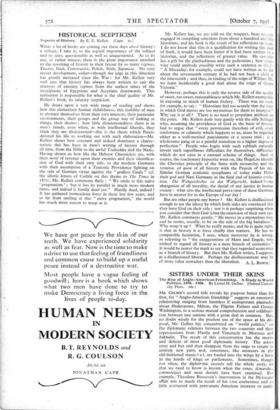HISTORICAL SCEPTICISM
Aspects of History. By E. E. Kellett. (Cape. 5s.)
WHAT a lot of books are coming out these days about history : a tribute, I take it, to the topical importance of the subject and its uses, questionable as well as unquestioned. As to its use, or rather misuse, there is the great importance attached to the rewriting of history in their favour by so many regimes, Fascist, Nazi, Communist, Polish, Irish, Japanese. No very recent development, either—though the urge in this direction has greatly increased since the War : for Mr. Kellett very well sees that history has always been written to suit the interests of existing regimes from the earliest times of the inscriptions of Egyptians and Assyrians downwards. This realisation is responsible for what is the chief quality of Mr. Kellett's book, its salutary scepticism.
He draws upon a very wide range of reading and shows how this elementary human childishness, this inability of men to abstract themselves from their own interests, their particular environments, their groups and the group way of looking at things, their desires ; how little disinterestedness there is in men's minds, even when, as with intellectual liberals, they think they are disinterested—this is the thesis which Pareto devoted his life to working out with such elaboration—Mr. Kellett shows how constant and indeed dominant a charac- teristic this has been in men's writing of history through all time, from the Bible to the awful Treitschke &id the Nazis. Having shown us how like the Hebrew Chroniclers are, with their motif of revenge upon their enemies and their identifica- tion of God with their own side, to the modem Germans with their assumption of a Teutonic Providence fighting on the side of German virtue against the " godless Gauls " (cf. the idiotic letters of Carlyle on this theme to The Times in 5870), Mr. Kellett comments flatly : " We smile at this naive ' pragmatism ' ; but it has its parallel in much more modern times, and indeed is hardly dead yet." Hardly dead, indeed ! It has gathered tremendous force in these last few years, and so far from smiling at this " naive pragmatism," the world has much more reason to weep at it.
Mr. Kellett has, we are told on the wrapper, been ret. entiv engaged in compiling selections from about a hundred and fifty historians, and his book is the result of his reflections on them. I do not know that this is a qualification for writing this kind of book, it would have been better if it had been written by a historian, and the reflections of greater value. He certainly has a gift for the platitudinous and the pedestrian ; how other- wise could anybody possibly write such a sentence as this ? : " A Macaulay, for example, could not have written as he did about the seventeenth century if he had not been a child of the nineteenth ; and thus, in reading of the reign of William III, we learn incidentally a good deal about the reign of Queen Victoria."
However, perhaps this is only the reverse side of the quality of sweet, too sweet, reasonableness which Mr. Kellett exemplifies in exposing so much of human foolery. There was no need, for example, to say : " Historians feel too acutely that the ways in which God moves are too mysterious for them to interpret." Why say it at all ? There is no need to propitiate anybody on the point. Mr. Kellett deals very gently with the silly Schlegel who, assuming the providence of God as the basis of history, had to argue that " every permission therefore of evil, every misfortune or calamity which happens to us, must be regarded either as a well-merited punishment or a severe trial ; as a wholesome pang or as a painful transition to a higher degree of perfection." People who begin with such rubbish naturally invent such superfluous difficulties for themselves, difficulties which do not exist in a rational scheme of things. And, of course, the reactionary hypocrite went on, like Hegel,"to identify the Christian principle of the State with monarchy, and the terminus ad quern of all history with the Prussia of his day. Similar German academic sycophants of today make Hitler their god and Nazi Germany as the final end of historic evolu- tion. Die Weltgeschichte ist das Weltgericht, indeed !—the abnegation of all morality, the denial of any justice in human society : what sins the intellectual perversion of these Germans have to answer for in the Europe of our day !'
But are other people any better ? Mr. Kellett is disillusioned enough to see the idiocy by which both sides are convinced that they have God on their side ; nor is it perhaps surprising when you consider that their God is but the extension of their own ego. Mr. Kellett comments gently, " He moves in a mysterious way, and he seems, usually, to be on the side of the big battalions." Why wrap it up ? What he really means, and he is quite right, is that in history it is force chiefly that matters. He has no comparable hesitation, I note, where moreover he is wrong, in referring to " the exaggerations of Marx and Engels, who wished to regard all history as a mere branch of economics." It would be nearer the mark to say that they regarded economics as a branch of history. But then Mr. Kellett writes, I suppose, as a disillusioned liberal. Perhaps the disillusionment may be of more value nowadays than the liberalism. A. L. ROWSE.














































 Previous page
Previous page